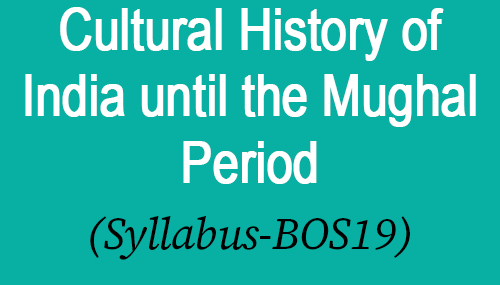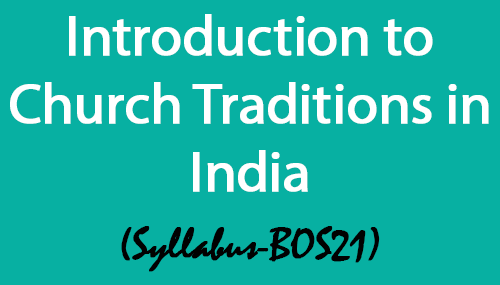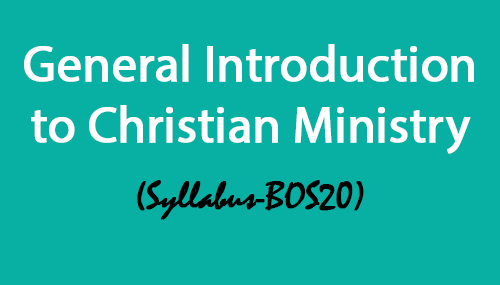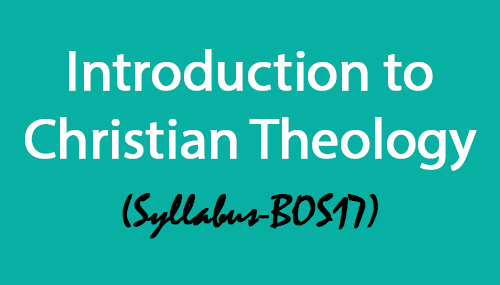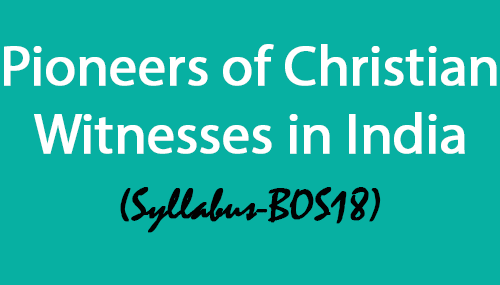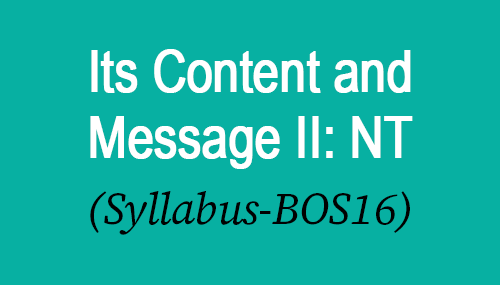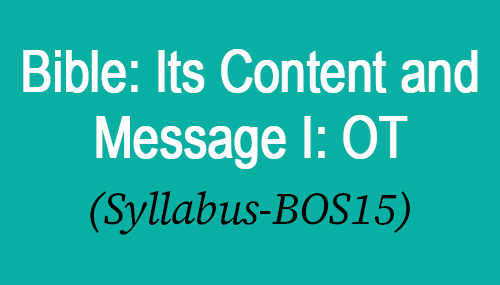Course Code: BOS19
Cultural History of India until the Mughal Period
BD Orientation, Semester I & II, 4 Credit Hours, Senate Paper
Course Objectives
-To introduce the multi-layered cultural frameworks of India
-To enable the students to understand the pattern of cultural differentiations within India
-To enable the students to see that t despite such internal differentiations, there are also negotiating and intertwining traditions
-To gain new insights for creative inter-cultural and trans-cultural relations between different communities.
Note
This syllabus is meant for theological colleges in India. Colleges from other countries shall device similar syllabi.
Course Requirements
Final examinations 100%
Course Outline
Unit I:
Definitions and dimensions of culture, interplay and tension of culture and religion
Unit II:
Early Vedic and non-Vedic cultures; the proto-types of caste
Unit III:
Socio-cultural and political ferment towards reform: the case of Buddhism and Jainism in the empires of Magadha, Maurya and the influence of Ashokan reform
Unit IV:
The Post-Mauryan period in North India: Indo-Greeks, Parthians, etc. Brief discussion on religion and culture in the period of the Guptas
Unit V:
Brief political and linguistic survey of South Indian Sangha age; Pallavas, Choles, Chalukyas, Vijayanagar: politics and administration, society, economy and art
Unit VI:
Arab invasion and formation of Delhi Sultanate, Mohammad Tughlug’s innovations, composition of rural society, nobility
Unit VII:
Mughal empire; significance of Akbar and his socio-religious policies; decline and disintegration of the empire after Akbar
Unit VIII:
Impact of Islam on Indian culture and society; monotheistic movements: Kabir, Guru Nanak, Bhakti and Sufi movements; Hindu-Muslim interactions and conflicts
Unit IX:
Rise of regional powers: Marathas, Sikhs, Afghans, and the arrival of European powers
Unit X:
Evaluation of issues accruing from the history of polities, cultures, and social structures; insights for understanding Indian society today.
Bibliography
Ambedkar, B.R. “Who are the Shudras?” In: Dr Babasaheb Ambedkar s Writings and Speeches. Vol.7. Bombay: Dalit Publications, 1990.
Basham, A.L. Studies in Indian History and. Culture. Calcutta: Sambodhi Publications, 1964.
—___-—,, ed. A Cultural History of India. New Delhi: OUP, 1975.
—____. The Wonder that was India. New Delhi: 1986.
Bhabha, Homi. The Location of Culture.London: Routledge, 1994,
Bhattacharjee, J.B., North East Indian Perspectives in History, New Delhi: Vikas, 1995.
Bhattacharyya, N.N., Religious Culture of North Eastern India, New Delhi: Manohar, 1995.
Chopra, PN., etal., eds. A comprehensive History of ‘Modern India. New Delhi: Sterling, 2003.
Dalrymple, William. The Last Mughal: the Fall of a Dynasty, Delhi 1857. New Delhi: Penguin, 2006.
Dube, Ishta Banerjee and Saurabh Dube, eds. Ancient to Modern: Religion, power and
Community in India. New Delhi: OUP, 2009.
Greetz, C. The Interpretation of Cultures. New York: Harper, 1973.
Guha, R., ed. Subaltern Studies: Writings on South Asian History and Society. Vols. 1 & II, New
Delhi: Oxford University Press, 1982, 1983.
Gupta, S. K. The Scheduled Castes i in Modern Indian Politics. New Delhi: Sage, 1985.:
Horam, M., Social and Cultural Lives of the Nagas. Delhi: B. R. Publishing, 1977
IGNOU. Elective History of: ‘India 01 to 05. New Delhi: IGNOU, 1989.
Ilaiah, K. Why Iam not a Hindii?: A Sudra Critique of Hindutva Philosophy, Culture and Political Economy. Calcutta: Samya, 1996,
Jha, D.N. Ancient India: An Introductory Outline. New Delhi: 1986.
Kosambi, D.D. An Introduction to the Study of Indian History. Bombay: Popular Prakashan, 1975.
___. The Culture and Civilization of Ancient India in Historical Outline. New Delhi: 1987.
Lorenzen, David, ed. Religious Movements in South Asia 600-1800. New Delhi: OUP, 2004.
___. Who Invented Hinduism? Essays on Religion in History. New Delhi: Yoda Press, 2006.
Majumdar, R- C., ed. The History and Culture of the Indian People. Vols. t- li. Bombay: Bharatiya VidyaBhavan, 1951- 1977.
Mani, BrajRanjan. Debrahmanizing History. New Delhi: Manohar, 2005.
Miri, Sujata, Religion and Society of North East India, Delhi: Vikas, 1980.
Narayan, R.K. Swami and Friends: A Novel of Malgudi, 1935. Ind Ed. Greenwich: Fawcett Publications, 1970.
Oddie, GA. Social Protest in Indian: British Protestant Missionaries and Social Reform 1850 1900. New Delhi: Manohar Publications, 1970.
Pakem, B., Insurgency in North-East India, New Delhi: Om Sons Publications, 1997.
Pandey, Gyanendra. The Construction of Communalism in Colonial North India. New Delhi: OUP, 1990.
Panikkar, K.M. Asia and Western Dominance: A Survey of the Vasco Da Gama Epoch of Asian History, 1498-1945, London: George Allen &Unwin, 1953.
Raj, Mohan Gandhi, Revenge and Reconciliation. Penguins, 2009
Robinson, Rowena. Christians of India. New Delhi: Sage, 2003.
Roy, Arundhati. The God of Small Things. London: Flamingo, 1997.
Saraswati, B., Tribal Thought and Culture. New Delhi: Concept, 1972.
Sen, Amartya. The Argumentative Indian: Writings of Indian History, Culture, Identity: New Delhi: Penguin, 2005.
Sikand, Yoginder. ‘Sacred Spaces: Exploring Traditions of Shared Faith in India. New Delhi: Penguin, 2003.
Sharma, Jyotirmaya. Terrifying Vision: M.S. Golwalkar; The RSS and India. New Delhi: Penguin, 2007.
Sharma R.S. Material Cultures and the Social Formations in Ancient India. New Delhi: 1983. ,
___. Rethinking India’s Past. New Delhi: OUP, 2009:
Spear, Percival.d History of India.Vols.1 & II. New Delhi: Penguin, 1965.
Thapar, Romila. History of India. Vol. 1. New Delhi: 1983.
__, ed, Recent Perspectives of Early Indian History. Mumbai: Popular Prakashan, 1995.
___. Cultural Pasts: Essays in Early Indian History. New Delhi: OUP, 2000.
___. Early India: From the Origin to AD 1300, New Delhi: Penguin, 2002.
___. Somanatha: The Many Voices of a History. New Delhi: Penguin, 2004.
Viswanathan, Gauri. The Masks of Conquest: Literary Study and British Rule in India: New York: Columbia University Press, 1989.
Friendly Note
Bachalor of Divinity Materials is your one-stop resource for comprehensive Biblical studies, designed to support students pursuing a Bachelor of Divinity (B.D.) and other theological courses. Our website is a dedicated platform that provides access to the full syllabus of the Bachelor of Divinity course along with detailed answers, ensuring a thorough understanding of every subject and topic covered in your curriculum.
Here, you will find a vast collection of assignments, study guides, articles, and research papers meticulously curated to assist you in excelling academically. The platform also features a rich selection of theological books, journals, and resources spanning diverse subjects such as Old Testament, New Testament, Systematic Theology, Church History, Biblical Languages, and Pastoral Studies.
To make your learning experience convenient and accessible, we offer downloadable PDFs of study materials, including books and journals, allowing you to learn anytime, anywhere. Whether you are preparing for exams, writing assignments, or conducting in-depth research, these resources are tailored to meet the needs of both students and scholars in biblical and theological studies.
With a commitment to empowering theological learners, our mission is to provide high-quality, authentic, and practical study materials. Explore Bachalor of Divinity Materials to grow spiritually, academically, and intellectually as you deepen your understanding of God’s Word and Christian doctrine. This platform is a valuable resource for aspiring ministers, pastors, and anyone dedicated to the study of theology and biblical teachings.
